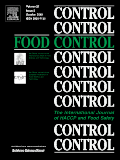
FOOD CONTROL
metrics 2024
Navigating the future of food safety and sustainability.
Introduction
FOOD CONTROL, published by Elsevier Science Ltd, stands at the forefront of research in the fields of Food Science and Biotechnology, holding a prestigious Q1 ranking in both categories as of 2023. With an impact factor reflecting its influential role in the scientific community, this journal is dedicated to advancing the understanding and control of food safety, quality, and regulations from 1990 to its projected convergence in 2025. Food Control provides a platform for innovative research and critical reviews that address the pressing global challenges in food safety, sustainability, and technological advancements in the industry. Researchers, professionals, and students are encouraged to engage with its content, fostering a deeper understanding of the intersection between food science and biotechnological advancements, all while benefiting from the extensive reach of its Scopus rankings, which place it in the top 5th percentile of its respective fields.
Metrics 2024
 1.15
1.15 5.60
5.60 5.40
5.40 162
162Metrics History
Rank 2024
Scopus
IF (Web Of Science)
JCI (Web Of Science)
Quartile History
Similar Journals
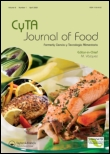
CyTA-Journal of Food
Advancing food science for a sustainable future.CyTA-Journal of Food is a prestigious academic journal published by TAYLOR & FRANCIS LTD, dedicated to advancing the field of food science and technology through the dissemination of innovative research and practical knowledge. With an ISSN of 1947-6337 and an E-ISSN of 1947-6345, this journal stands out with its strong impact factor and is currently placed in the Q2 quartile across multiple categories, including Chemical Engineering, Chemistry, and Food Science, making it a vital resource for researchers and professionals alike. The journal has been an integral part of the academic community since its inception in 2009, and continues to publish cutting-edge articles through to 2024. Its alignment with Scopus ranks further signifies its influence, notably achieving 67th percentile in Industrial and Manufacturing Engineering. As an Open Access journal, it ensures widespread accessibility to its valuable content, promoting collaboration and knowledge sharing among scientists, engineers, and students dedicated to enhancing food safety, quality, and sustainability.
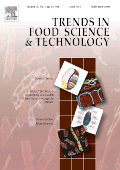
TRENDS IN FOOD SCIENCE & TECHNOLOGY
Connecting research and real-world food solutions.Trends in Food Science & Technology, published by Elsevier Science London, stands as a premier journal in the fields of food science and biotechnology. With an impressive Q1 ranking in both the food science and biotechnology categories, it is recognized for its rigorous peer-reviewed articles that advance knowledge and innovation in the sector. The journal’s Scopus rankings validate its significance, placing it in the top percentile among its peers, with a remarkable rank of #2 out of 389 in Agricultural and Biological Sciences - Food Science, and #4 out of 311 in Biochemistry, Genetics, and Molecular Biology - Biotechnology. Since its inception in 1990, the journal has become a vital resource for researchers, professionals, and students alike, offering insights into contemporary challenges and trends impacting food technology. Although it operates under a subscription model, the quality of research published within its pages makes it an essential read for anyone involved in advancing the science of food.

Food Quality and Safety
Connecting researchers to elevate food standards.Food Quality and Safety is a leading academic journal published by Oxford University Press, dedicated to advancing research in the critical field of food science. With an ISSN of 2399-1399 and an E-ISSN of 2399-1402, the journal has gained prestigious recognition, securing a Q1 ranking in the Food Science category as per Scopus rankings, and being positioned at #69 out of 389 in its field, reflecting its influence and reputation within the discipline. Since its transition to Open Access in 2017, the journal has broadened its reach, ensuring that cutting-edge research related to food quality, safety measures, and consumer protection is accessible to researchers, professionals, and students alike. With a commitment to publishing high-quality articles and reviews, the journal addresses contemporary challenges in the food industry and promotes a better understanding of food safety protocols. Based in Oxford, United Kingdom, Food Quality and Safety plays a pivotal role in shaping future research and practices in food science, making it an essential platform for scholars who aim to impact the industry through innovative findings and applied research.
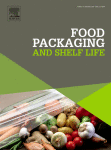
Food Packaging and Shelf Life
Fostering collaboration in the quest for sustainable food systems.Food Packaging and Shelf Life is an esteemed peer-reviewed journal published by Elsevier, dedicated to advancing the field of food science through innovative research on packaging materials and their impact on food preservation. With an impressive impact factor and ranking within the Q1 quartile across several categories—including Biomaterials, Food Science, and Microbiology (medical) provided in Scopus raking—this journal serves as a vital resource for researchers, academics, and industry professionals aiming to enhance food safety and quality. Established in 2014, it encompasses a multidisciplinary approach that integrates engineering, microbiology, and materials science perspectives to address current challenges in food packaging. Although currently not an open-access journal, it offers various subscription options, ensuring accessibility to cutting-edge research. As the sector rapidly evolves, Food Packaging and Shelf Life remains a critical platform for disseminating knowledge and fostering collaboration in the pursuit of sustainable food systems.
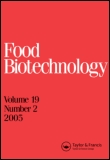
FOOD BIOTECHNOLOGY
Pioneering Research in Food BiotechnologyFOOD BIOTECHNOLOGY is an essential journal for those engaged in the rapidly evolving fields of food science, biotechnology, and applied microbiology. Published by Taylor & Francis Inc., this journal has been a prominent platform since its inception in 1987, with a convergence of insights expected to continue until 2024. With an ISSN of 0890-5436 and an E-ISSN of 1532-4249, it holds significant academic weight, reflected in its 2023 rankings which place it in the Q3 category for both Applied Microbiology and Biotechnology and Biotechnology, alongside a stronger Q2 classification in Food Science. Although it currently does not operate as an open-access journal, its contributions to food biotechnology are invaluable for researchers, professionals, and students alike, providing a rigorous peer-reviewed outlet for innovative studies that advance the understanding of food processing, safety, and biotechnological applications. The journal’s relevance is further underscored by its Scopus rankings, which position it within the top tiers of its respective categories, making it a critical resource for the scientific community aiming to pioneer advancements in food biotechnology.
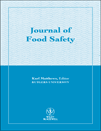
JOURNAL OF FOOD SAFETY
Elevating standards in food science and safety.Journal of Food Safety is a premier resource in the field of food science, offering invaluable insights into food safety practices, microbiology, and parasitology. Published by WILEY, this journal has been a pivotal platform for the dissemination of research since its inception. With an impressive impact factor reflecting its esteemed reputation, the journal caters to a diverse audience of researchers, professionals, and students committed to advancing knowledge in food safety. While currently not an open access journal, it still provides essential findings that contribute significantly to the understanding of foodborne pathogens and preventive measures. Recognized in the Q2 and Q3 quartiles across various relevant disciplines, including Food Science, Microbiology, and Parasitology, the Journal of Food Safety continues to uphold high standards in scientific research and education. Researchers are encouraged to submit their manuscripts and engage with groundbreaking studies that are shaping the future of food safety.

Food Science of Animal Resources
Transforming Animal Science into Practical Solutions for TomorrowFood Science of Animal Resources is a prestigious, peer-reviewed journal published by the Korean Society of Food Science and Animal Resources, serving as a vital platform for disseminating advanced research in the fields of Animal Science and Food Science. Since its inception in 2018, the journal has quickly established itself with an impressive Q1 ranking in both categories for 2023, indicating its relevance and influence in the academic community—evident by its ranking of #23 in Animal Science and Zoology and #78 in Food Science among thousands of journals. Operating on an Open Access model since 2019, it enables unrestricted access to cutting-edge research for a global audience, facilitating collaboration and innovation. Its commitment to quality and rigor makes it an essential resource for researchers, professionals, and students dedicated to advancing knowledge in food safety, nutrition, and sustainable practices within the animal resource sector. Set against the vibrant backdrop of South Korea, the journal aims to bridge gaps in knowledge and foster communication among scholars and practitioners worldwide.
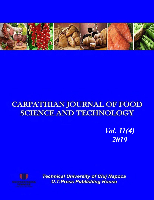
Carpathian Journal of Food Science and Technology
Transforming Ideas into Innovations in Food ScienceCarpathian Journal of Food Science and Technology, a distinguished publication from the NORTH UNIV CENTER BAIA MARE, has been a pivotal platform for disseminating groundbreaking research in the field of food science since its inception in 2009. With an ISSN of 2066-6845 and an E-ISSN of 2344-5459, this Open Access journal aims to promote knowledge and innovation, offering unrestricted access to its content, thereby enhancing visibility for authors and facilitating a wider readership. Based in Romania, the journal plays a crucial role in advancing scientific inquiry within the agricultural and biological sciences, particularly focusing on contemporary food science issues. As it continues its convergence through 2024, the journal currently holds a Q4 ranking in the Food Science category, allowing it to carve out a unique niche within the academic community despite its current Scopus percentile ranking of 19th. Scholars, researchers, and students in the field will find the journal an invaluable resource for the latest advancements and discussions, making it an essential addition to their academic pursuits.
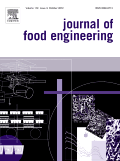
JOURNAL OF FOOD ENGINEERING
Unlocking the potential of food science and engineering.JOURNAL OF FOOD ENGINEERING, published by ELSEVIER SCI LTD, stands as a leading platform for innovative research within the realm of food science, focusing on the engineering principles applied to food production and processing. With an impressive impact factor reflective of its significance in the field, the journal boasts a Q1 ranking in Food Science and ranks #23 out of 389 in Agricultural and Biological Sciences according to Scopus metrics, placing it in the 94th percentile among its peers. Since its inception in 1982, the journal has aimed to disseminate high-quality, peer-reviewed research that informs and shapes industry practices and academic explorations. Although it does not currently offer an open access option, the journal is dedicated to fostering knowledge and innovation through rigorous editorial standards and a commitment to covering a broad range of topics related to food engineering. Researchers, professionals, and students alike will find the journal an invaluable resource for advancing their understanding of the scientific and technological facets of food systems.

FOOD HYDROCOLLOIDS
Advancing the Science of Food: Unveiling Hydrocolloids' PotentialFOOD HYDROCOLLOIDS is a premier peer-reviewed journal published by Elsevier, focusing on the interdisciplinary field of food science, particularly the role of hydrocolloids in food systems. Established in 1986, this journal has become a leading platform for disseminating innovative research and reviews that advance the understanding of hydrocolloids' chemical and physical properties, their applications in food technology, and their impact on food quality and safety. With a commendable impact factor and consistently ranked in the Q1 quartile across diverse categories—including Chemical Engineering and Food Science—FOOD HYDROCOLLOIDS stands at the forefront of cutting-edge research, evidenced by its top-tier Scopus rankings (8th in Food Science and 8th in General Chemical Engineering). Researchers, professionals, and students are encouraged to explore the wealth of knowledge available through this journal, showcasing advancements and best practices in the use of hydrocolloids for food formulation and processing.